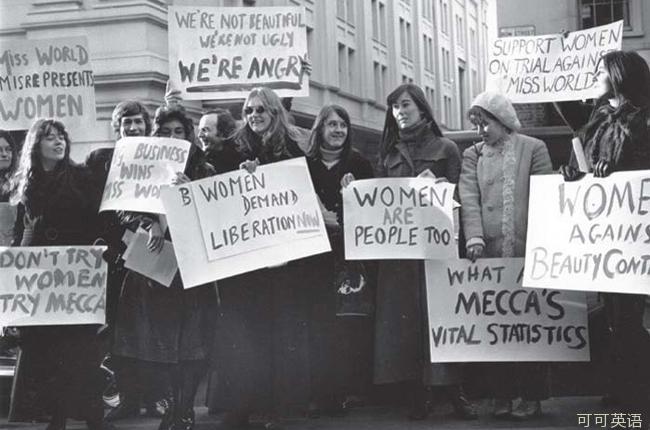
Some women don't want to become bishops. They don't even want other women to become bishops. That much is evident from records released by Church House, which show that women made up almost half of the lay people who voted against legislation to allow female bishops in the Church of England. Voting figures show that 33 of the 74 General Synod lay members who voted against the measure were women, most of them conservative evangelicals or members of the church's Anglo-Catholic wing. They had the support of another 2,200 women who signed a petition opposing reform.
一些女性不想成为主教。她们甚至不希望其他女性也成为主教。从英国圣公会发布的记录数据来看这是明显的,表明女性让几乎一半的门外汉来投票反对允许女性担任英格兰教会的主教的立法。投票数据显示74名圣公会外行成员中反对这项法案的有33名是女性,他们中大多数是保守的福音派教会成员或国教教徒。她们获得了另外2200名签署了一份请愿书来反对改革的女性的支持。
It's hard not to react to these figures by asking why some women appear to be their own worst enemies. Why do they actively oppose what seems to be in their own interest? The General Synod vote runs against the current of history, which suggests that women are increasingly voting for politicians who favour equality, such as President Obama.
面对这些数据很难不为所动,不禁要问为什么一些女性似乎是她们自己的最大敌人?为什么她们积极反对似乎符合她们自身利益的事情?总议会投票反对历史现状,这表明女性越来越支持倡导平等的政客,比如奥巴马总统。
Reactionary positions on abortion and contraception were defeated in one contest after another in the US last month, and opinion polls in the UK suggest that women voters are deserting the Conservatives in droves.
对堕胎和节育的反对立场上个月在美国于一轮轮的抗议中被驳倒,而民意调查结果表明英国女性选民成群结队地抛弃了保守派。
The idea that placing women in positions of authority over men is somehow against the natural order of things sounds quaint in the 21st century . Yet it still strikes a chord with a surprising number of women – not just in the church but also, shamefully, in politics. On Monday there wasn't a single woman on the government frontbench to hear George Osborne announce the next governor of the Bank of England. Women ministers don't need to bother their little heads about finance, it appears, any more than women in the church need to put on robes and tell male priests what to do in their own parishes. After last week it also seems that women don't need, or don't have the opportunity, to apply for the job of director general of the BBC.
在权位上将女性置于男性之上某种程度上违反自然秩序的想法在21世纪听起来很可笑。但它仍然在惊人数量的女性中引起共鸣——不仅仅在教堂,可悲的是在政治上。周一没有一个单身女性在政府议会前座听到乔治•奥斯本宣布未来的英格兰银行行长。女部长不需要为金融问题伤脑筋,看来,女人同样需要在教会穿上长袍,告诉男祭司们在他们自己的教区要做些什么。上周之后,似乎女性也不需要或没有机会去申请英国广播公司总裁的位置。
This goes some way to explaining the power politics behind otherwise inexplicable decisions. Faced with a gap between the rhetoric of equality and what actually happens within organisations, it's not so surprising that some women choose the safe option of identifying with traditional centres of power. Look at those "first ladies" who find it easier to get close to power than seek it on their own behalf. When Carla Bruni-Sarkozy announces in Vogue that women don't need feminism, she's speaking as a woman who's experienced the material advantages of attaching herself to one of the world's most powerful men.
这一定程度上解释了那些令人费解的决策背后的强权政治。面对关于平等的美好说辞和组织内实际上发生的事情之间的差距,一些妇女在认同传统权力中心中做出的最安全选择并不令人意外。看看那些发现接近权力要比为自己利益追求权力更容易的“第一夫人”们。当卡拉•布鲁尼在《Vogue》上宣布女性不需要女权主义时,她是作为将自己依附于世界上最有权势男人之一并享受着优越物质条件的女人在发言。
These women have got where they have – somewhere quite comfortable – without rocking the boat, and they're not keen on women who challenge the status quo. Identifying with men is a traditional means of negotiating patriarchal power, and women who go down that route tend to share reactionary male views of other women. If you're a conservative woman in the Church of England, the prospect of "pushy" women getting power is quite scary, so of course you're going to vote against it. The last thing any traditional woman wants to be accused of is appearing confrontational, even if accepting male power is self-defeating in the long run.
这些妇女已经找到了她们的归属——相当舒适的归属——没有捣乱,她们不热衷于挑战现状的女人。认同男人是与家长制权力谈判的一种传统方式,走这条路的女性倾向于分享其他女性保守的男性观。如果你是英格兰教会的一个保守女人,“爱出风头”的女性获得权力的前景是相当可怕的,所以你当然要投票反对它。任何一个传统女性想要指责的最后一件事是出现对抗,即使接受男权从长远来看弄巧成拙。
In many ways, women voting against women is hardly a new phenomenon. Before the first world war, the threat of becoming "unsexed" was used against the suffragettes, scaring some women into joining the Anti-Suffrage League founded in 1908 by the novelist Mrs Humphry Ward.
在许多方面,女性投票反对女性并不是一个新现象。第一次世界大战前,变成不男不女的威胁被用来对付妇女参政权论者,吓唬那些加入小说家汉弗莱•沃德女士于1908年成立的反选举权联盟的女性。
In her 1983 book Right-Wing Women, Andrea Dworkin argued that some women acquiesce to male authority in order to gain protection from male violence. She was right, but it isn't just fear of violence that makes women act against their long-term interest. There's also the little question of approval and status, as Vogue's interview with Bruni-Sarkozy reveals. "I'm not at all an active feminist," trills the wife of the former president of France. Channelling her inner housewife evidently works for her, even if it's not a role most modern women aspire to.
在她1983年出版的《右翼女性》这本书里,安德里亚德沃金认为一些女性默许男性权威是为了从男性暴力中获得保护。她是对的,但不只是对暴力的害怕使得女性违反她们的长远利益。还有一个批准和地位的小问题,正如布鲁尼在《Vogue》采访中透露的。“我一点都不是活跃的女权主义者,”前法国总统的妻子说道。与她内心的家庭主妇磨合对她而言显然是卓有成效的,即使这不是大多数现代女性渴望的角色。












